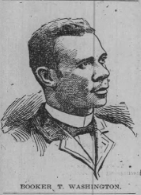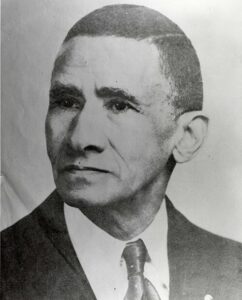Once upon a time in Black Entrepreneur History there lived an African American man named George A. Elmore serial businessman in South Carolina who led the fight against discrimination at the voting polls which led to the right of African Americans all across the nation to have the right to vote in primaries.
George Elmore was born on March 31, 1905 in Holly Hill, South Carolina, and he had up to an eighth grade education. He became a businessman, owning and running a couple of retail stores and taxi business in Richland County, Columbia, South Carolina. He married a woman named Laura Belle, and they had four children.
GEORGE A. ELMORE’S VOTING RIGHTS FIGHT FOR AFRICAN AMERICANS
George Elmore brought the complaint against the South Carolina Democratic Party that he and other qualified Black Americans[1] been denied in the year 1946 the right to vote for congressman in the state’s primaries because voting was only open to white people[2]. This was racial discrimination according to the Constitution of the United States Title 8 USCA Section 31 which stated that “race, color or previous condition may not affect the right to vote”. South Carolina white governorship didn’t want to obey the federal law due to the harsh racism at that time. White supremacists were prepared to fight Elmore and anyone else for the primaries vote to remain whites only by altering the state’s laws making it a “club” so they wouldn’t have to follow laws[3].
George Elmore’s lawsuit against the state’s party was the landmark case called Elmore vs. Rice, and it was in 1947 that the court sided with George Elmore, giving African Americans the right to vote in South Carolina. This landmark decision influenced the nation to give all African Americans the right to vote in primary elections around the country[4]. It was in the year of 1948, the very next year after this landmark decision in the case of Elmore vs. Rice, that about thirty thousand African Americans voted[5]. Meanwhile, white voters who were against the decision that black people would have a say so in the state of South Carolina became so irate that they removed themselves from the Democratic Party and became allegiant to the Republican Party[3].
Of course in the years that followed, this brought great satisfaction for Mr. George Elmore who stated the following to The State Newspaper of Columbia, SC, Richland County:
“This is certainly a most gratifying sight to me.” “I lined them up and it is a pleasure to me to see them allowed to vote. Yes, I am George Elmore. I was the plaintiff in the case before Judge Waities Waring – a case which threw open the Democratic primary to colored voters. I was the first colored Democrat allowed to vote since those who voted for General Wade Hampton. I and Judge Waring made possible this voting – I was the plaintiff and Mr. Waring was the judge.”[6]
The State, 12 Jul 1950, Wed ·Page 9

GEORGE A. ELMORE’S DEATH
Although George A. Elmore won the battle, it came at a price that he was willing to sacrifice. He was attacked on all sides and his businesses came to ruin, with wholesalers refusing to do business with him. Racist groups, such as the Ku Klux Klan, terrorized he and his family[3], and even the banking system harassed him to which they lost their home which was located on Calhoun street. They relocated to Tree Street where he opened a new business as a photographer during the 1950s.
In 1959 on February 25th, George A. Elmore passed away and was later buried in Randolph Cemetery in Columbia, South Carolina. His tombstone reads:
“Sacred to the memory of George Elmore who through unmatched courage, perseverance and personal sacrifice, brought the legal action by which Black people may participate in South Carolina Democratic Party Elections. Elmore vs. Rice 1947”.
Sources:
- The State,22 Jul 1947, Tue ·Page 4
- The Herald, 19 Aug 1947, Tue ·Page 1
- https://theconversation.com/how-one-man-fought-south-carolina-democrats-to-end-whites-only-primaries-and-why-that-matters-now-132559
- Black America Series, Columbia South Carolina, Vennie Deas-Moore, pg 95
- knowitall.org/photo/george-elmore-1905-1954-road-trip
- The State, 12 Jul 1950, Wed ·Page 9





More Related Stories
Isaac Scott Hathaway – Founder of Isaac Hathaway Art Company & Designer of First African American Coin
James Wormley – Founder of the Most Expensive Hotel in Washington D.C. in 1800s – the Wormley Hotel
William E. Matthews – Wealthy Financial Broker & Civil Rights Leader of 1800s